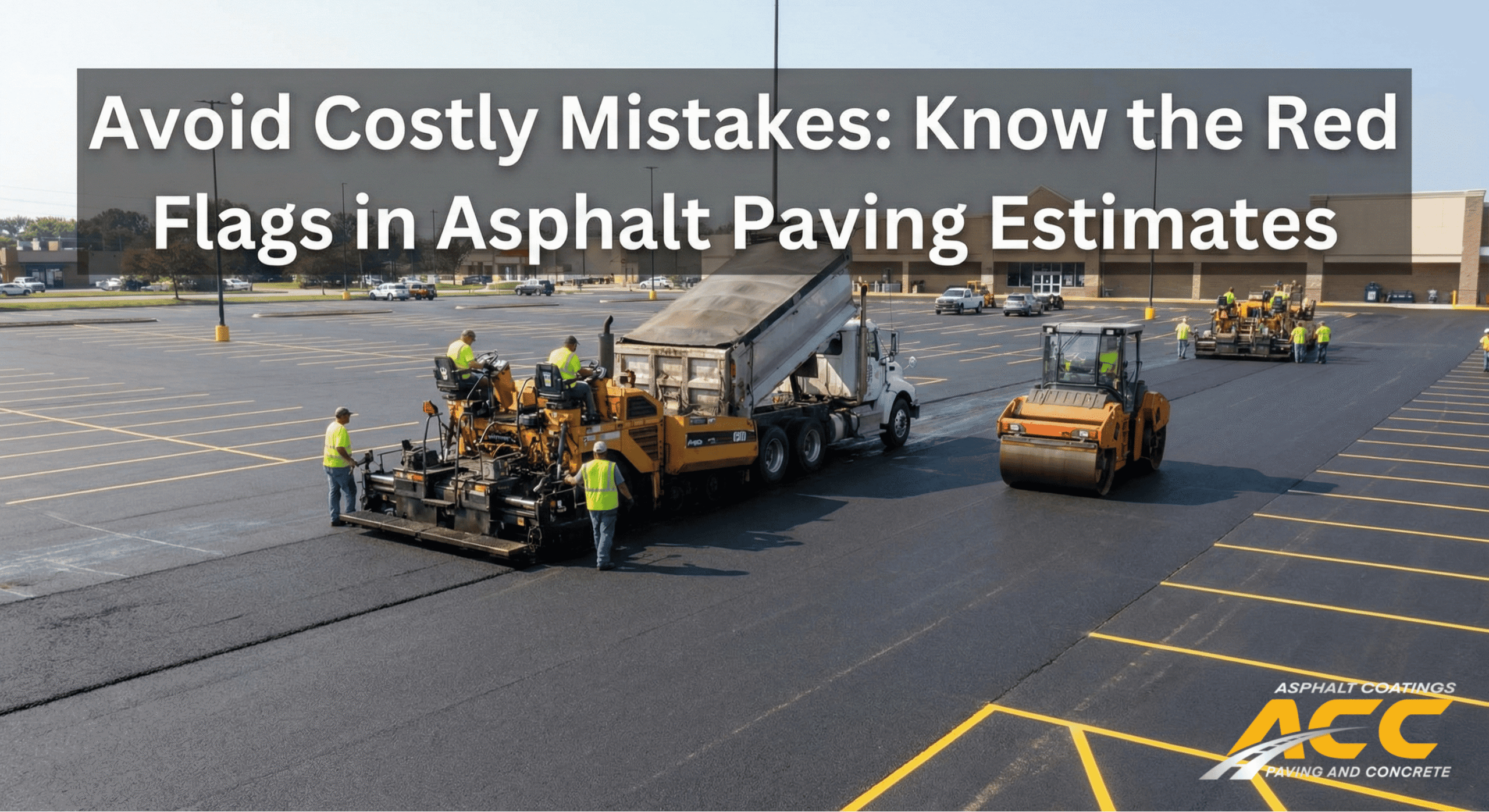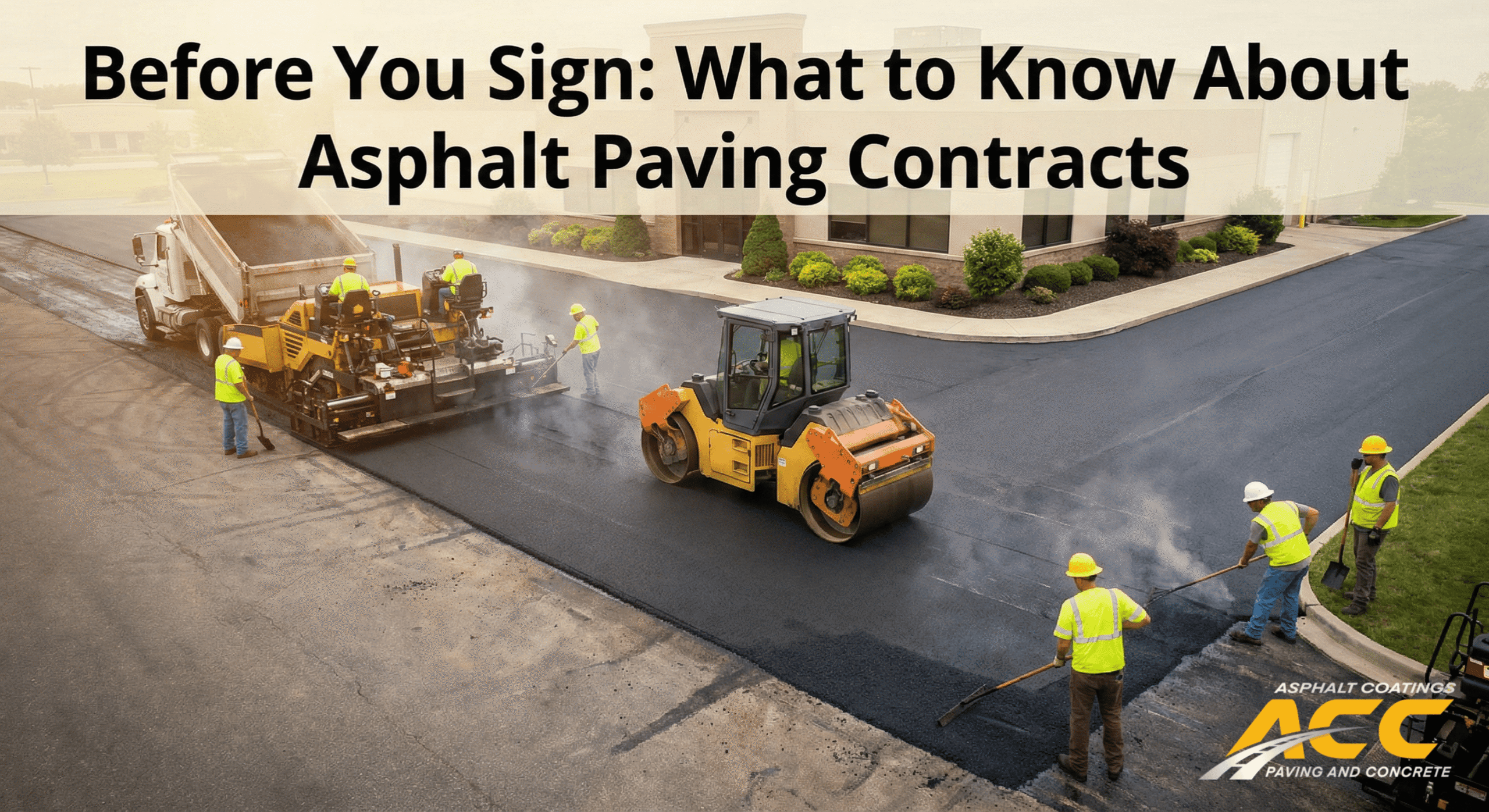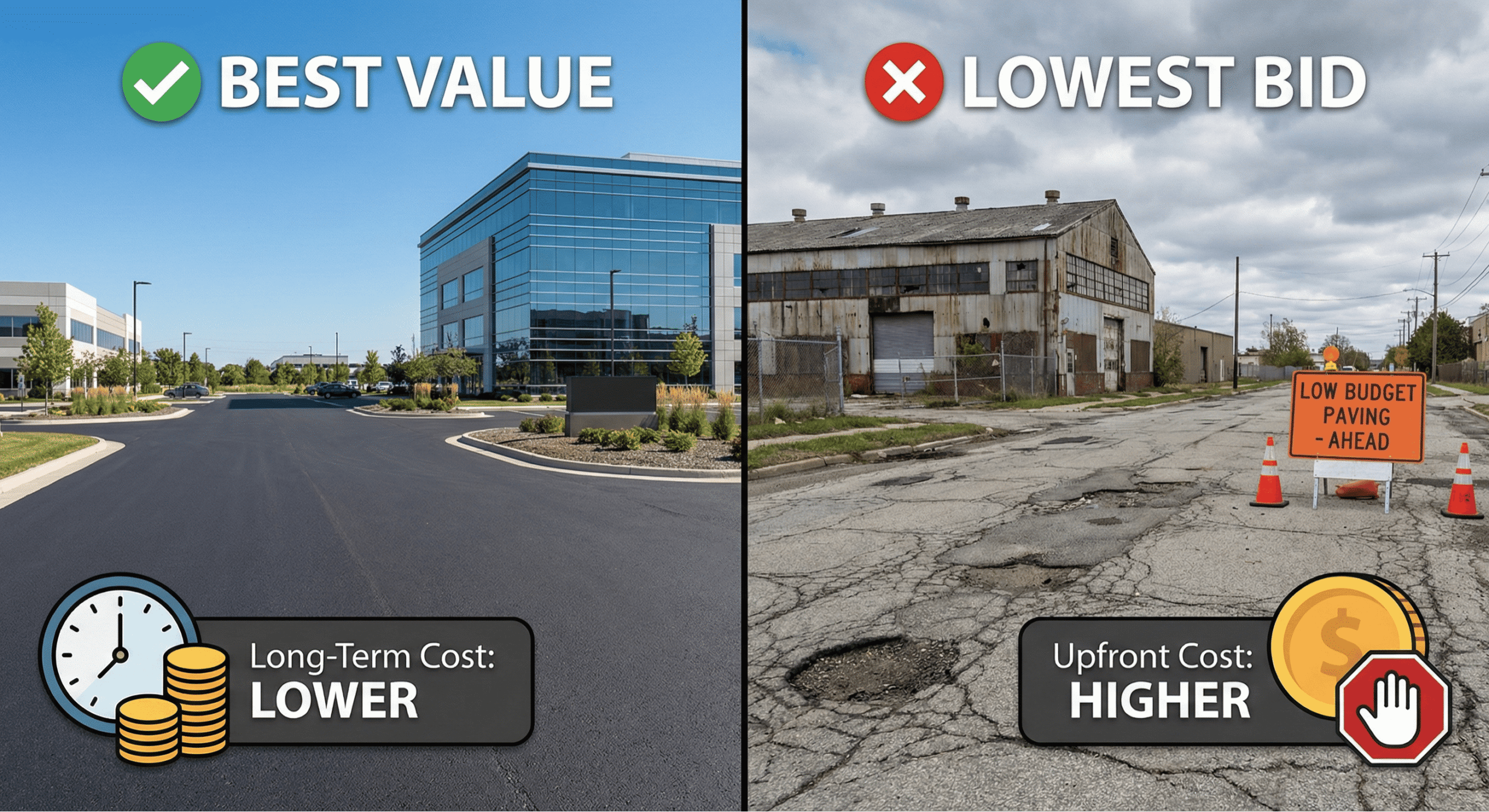Asphalt surfaces, from driveways to parking lots, are vital for safe and efficient transportation. In Denver, Colorado, where freeze-thaw cycles and temperature swings challenge pavement durability, choosing the right repair product is crucial.
This guide compares fast-setting and standard asphalt repair products, exploring their composition, curing times, durability, costs, and suitability for Denver’s unique climate. Whether you’re a homeowner, business owner, or property manager, Asphalt Coatings Company provides expert solutions to keep your pavement in top condition.
Why Asphalt Repairs Matter
Asphalt repairs are essential to maintain the safety, functionality, and appearance of paved surfaces. Neglecting damage like cracks or potholes can lead to costly replacements and safety hazards.
Pavement Lifespan & Common Failure Modes
Asphalt pavements typically last 15-30 years with proper maintenance, but Denver’s climate accelerates wear. Common failure modes include:
- Cracks: Caused by thermal expansion, contraction, or heavy traffic loads.
- Potholes: Result from water infiltration and freeze-thaw cycles, common in Denver’s winters.
- Raveling: Surface deterioration due to UV exposure and traffic wear.
These issues, if unaddressed, reduce pavement lifespan and increase repair costs [Asphalt Institute, MS-16].
Role of Repair Products in Safety & Cost
Timely repairs prevent minor issues from escalating, ensuring safe driving and walking surfaces. For example, filling potholes reduces trip hazards and vehicle damage. Cost-wise, repairs are significantly cheaper than full replacements, with patching costing $100-$400 compared to $2,000-$7,000 for a new driveway [HomeGuide, 2025], which shows why parking lot maintenance saves money.
What Is Fast-Setting Asphalt Repair?
Fast-setting asphalt repair products are designed for rapid curing, allowing immediate use after application. They are ideal for urgent repairs in challenging conditions.
Composition & Curing Mechanism
Fast-setting products, such as Rapid Set Asphalt Repair Mix, are often cement-based or polymer-based, unlike traditional asphalt mixes. They combine aggregates with a fast-curing binder, activated by water or air exposure, hardening in 30 minutes to 2 hours. For instance, QPR Fast-Setting Asphalt Pavement Repair uses proprietary water-activated technology, setting hard in one hour [Concrete Decor].
Ideal Use Cases (Cold Weather, Emergencies)
These products excel in:
- Cold Weather: Applicable in temperatures as low as 45°F, perfect for Denver’s winter repairs.
- Emergency Repairs: Ideal for potholes in high-traffic areas, minimizing downtime.
- Commercial Properties: Quick curing ensures businesses resume operations swiftly.
What Are Standard Asphalt Mixes?
Standard asphalt mixes include hot mix asphalt (HMA), cold mix asphalt (CMA), and polymer-modified asphalt, each suited for specific applications.
Hot Mix vs Cold Mix vs Polymer-Modified
- Hot Mix Asphalt (HMA): Composed of aggregates and asphalt cement, heated to 300-350°F for application. It’s durable and used for roads and parking lots [Erickson Asphalt].
- Cold Mix Asphalt (CMA): Pre-mixed with emulsified bitumen, applied at ambient temperatures. It’s less durable but suitable for temporary fixes [Asphalt Kingdom].
- Polymer-Modified Asphalt: Enhanced with polymers like SBS for improved flexibility and resistance to rutting and cracking [Asphalt Magazine].
Typical Applications & Curing Time
- HMA: Used for full-depth repairs and resurfacing, requiring 24-72 hours to cool to 100°F for traffic [McConnell & Associates].
- CMA: Applied for small potholes or cracks, often traffic-ready immediately but may take weeks to fully harden [RockAsphalt].
- Polymer-Modified: Used in high-traffic areas, curing times similar to HMA but with enhanced durability.
Key Comparison: Fast-Setting vs Standard
| Aspect | Fast-Setting | Standard (HMA/CMA) |
| Curing Time | 30 min–2 hrs, immediate traffic [QPR] | HMA: 24-72 hrs; CMA: Immediate–weeks [RockAsphalt] |
| Durability | Varies, some permanent [Rapid Set] | HMA: 15-30 yrs; CMA: 1-2 yrs [HomeGuide] |
| Cost per Ton | $500-$600 (estimated) | HMA: $40-$80; CMA: $320-$800 [HomeGuide] |
| Weather Suitability | All conditions, including cold [QPR] | HMA: >50°F; CMA: All conditions [Erickson] |
| VOC Emissions | Low/zero VOCs [Rapid Set] | Higher, especially HMA [ScienceDirect] |
Curing Time & Traffic Reopening
Fast-setting products cure in under an hour, allowing immediate traffic, ideal for urgent repairs. Standard HMA requires 24-72 hours to cool below 100°F, while CMA can be used immediately but may not fully harden for weeks [RockAsphalt].
Durability & Expected Lifespan
HMA offers superior durability, lasting 15-30 years for full-depth repairs. CMA is less durable, often lasting 1-2 years. Fast-setting products vary; some, like Rapid Set, claim durability comparable to HMA, while others are temporary [Lone Star Paving].
Cost per Ton & Lifecycle Costs
HMA costs $40-$80 per ton, making it cost-effective for large projects. CMA ranges from $320-$800 per ton due to smaller batch sales. Fast-setting products, estimated at $500-$600 per ton, have higher material costs but reduce labor and downtime expenses [HomeGuide].
Temperature/Weather Suitability
Fast-setting products can be applied in cold, wet conditions, crucial for Denver’s winter repairs. HMA requires temperatures above 50°F for proper compaction, limiting its use in colder months [Erickson Asphalt], emphasizing how weather and temperature impact asphalt paving quality.
Environmental & VOC Considerations
Fast-setting products like Rapid Set have zero VOCs, reducing environmental impact. HMA emits significant VOCs during heating, contributing to air pollution. CMA has lower VOCs but still higher than some fast-setting options [ScienceDirect].
Choosing the Right Repair Product
Selecting the appropriate repair product depends on several factors.
Assessing Site Conditions & Urgency
- Urgency: Fast-setting products are best for immediate repairs, like potholes in busy lots.
- Site Conditions: Assess damage extent; minor cracks suit CMA, while structural issues require HMA.
- Traffic Load: High-traffic areas benefit from HMA’s durability.
Compliance Factors (Local Codes, ADA, VOC)
Denver’s regulations may require low-VOC products for environmental compliance. ADA-compliant repairs, like smooth surfaces for accessibility, are critical for public spaces. Asphalt Coatings Company ensures compliance with local codes.
Bid Evaluation: Material Specs to Warranties
When evaluating bids, consider material quality, curing time, durability, and warranties. Fast-setting products may offer shorter warranties but quicker turnaround, while HMA provides longer-term guarantees.
How Asphalt Coatings Company Delivers
Asphalt Coatings Company, based in Denver, specializes in both fast-setting and standard asphalt repairs, tailored to your needs.
Fast-Setting Emergency Repair Offering
Our rapid-response team uses fast-setting products for urgent pothole and crack repairs, ensuring minimal disruption, especially during Denver’s harsh winters.
Standard Paving & Routine Maintenance Services
We provide full-depth HMA repairs and resurfacing for long-lasting results, ideal for planned maintenance in warmer months. Our routine services include sealcoating and crack filling to extend pavement life.
Succinct Process: Site Prep to Compaction
Our process involves thorough site preparation, removing debris, applying the appropriate repair product, and compacting for a seamless finish, ensuring compliance with industry standards.
Cost & ROI Comparison
Unit Cost vs Downtime Cost
Fast-setting repairs have higher material costs but lower downtime expenses, saving businesses from lost revenue. HMA repairs are cheaper per ton but require longer closures, increasing indirect costs.
Case Studies: Rapid Patch vs Standard Overlay
- Rapid Patch: A Denver commercial lot used fast-setting products for pothole repairs, resuming operations in hours, saving thousands in downtime.
- Standard Overlay: A residential driveway resurfaced with HMA lasted 20 years, reducing long-term maintenance costs.
Local Climate Considerations in Denver, Colorado
Denver’s semi-arid climate, with 300 days of sunshine, low humidity, and 60 inches of annual snow, impacts asphalt repair choices [Weather Spark].
Seasonal Temperature Impacts
Winter temperatures (22°F-45°F) favor fast-setting products for quick fixes. Summer highs (86°F-89°F) are ideal for HMA applications, ensuring proper curing.
Freeze-Thaw and Plow Damage
Freeze-thaw cycles cause potholes and cracks, exacerbated by snow plows. Fast-setting repairs address immediate damage, while HMA provides long-term resilience.
DEI & Environmental Compliance
Low-VOC Options Available
We offer low-VOC fast-setting products, aligning with Denver’s environmental regulations and reducing health risks [ScienceDirect].
Waste Disposal & Recycling
Asphalt Coatings Company recycles asphalt materials, using reclaimed asphalt pavement (RAP) to minimize waste and environmental impact [HomeGuide].
FAQs
Q: What is fast-setting asphalt repair?
A: A ready-to-use mix that hardens within 1 hour, ideal for urgent patches.
Q: How long before traffic can drive on standard asphalt repair?
A: Typically 24-72 hours for HMA, depending on temperature; CMA can be immediate.
Q: Does fast-setting asphalt last as long as standard?
A: No, standard HMA provides longer service life, especially under heavy loads.
Q: Which one is cheaper in the long run?
A: Standard HMA has better lifecycle costs; fast-setting reduces downtime costs.
Q: Can fast-setting be used in winter?
A: Yes, it’s formulated for low temperatures, unlike HMA.
Q: Are fast-setting products VOC compliant?
A: Many are low-VOC; check product datasheets for compliance.
Q: Does Asphalt Coatings Company offer both options?
A: Yes, we provide fast-setting emergency repairs and standard asphalt services.
Get a Free Quote from Asphalt Coatings Company
Need fast pothole repair today? Get your quote now from Asphalt Coatings Company. Schedule your standard asphalt resurfacing or book a free inspection in Denver to restore your pavement. Visit Asphalt Coating Company or call us to ensure your pavement withstands Denver’s climate.



